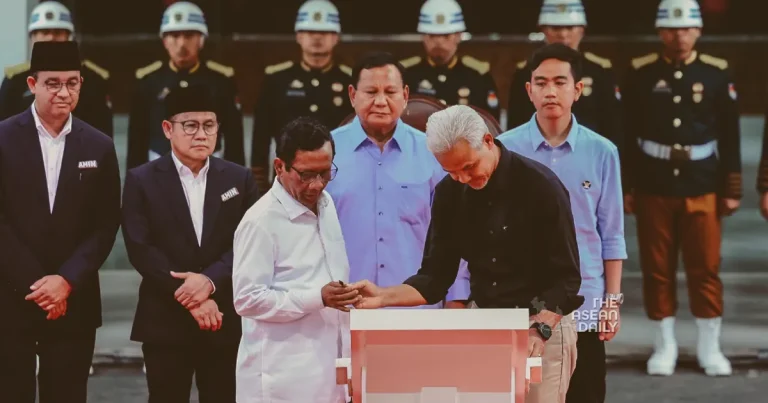12-12-2023 (JAKARTA) The stage was set for a clash of ideas on Tuesday night as Indonesia’s three presidential candidates engaged in a lively debate, kicking off a series of five such events leading up to the nation’s election on Valentine’s Day next year.
In the inaugural debate, candidates and their running mates – Anies Baswedan and Muhaimin Iskandar, Prabowo Subianto and Gibran Rakabuming Raka, and Ganjar Pranowo and Mahfud MD – vied for voter support by outlining their visions and proposed actions if elected to lead the country.
The debate covered crucial topics such as law, human rights, corruption eradication, governance, public service improvement, democracy strengthening, disinformation handling, and civic harmony management.
Anies Baswedan, the former 54-year-old governor of Jakarta, emphasized his commitment to upholding the law and ensuring justice for Indonesians. He pointed out the challenges faced by younger generations in expressing their opinions, citing government pressure and violent threats.
“There is a millennial as a vice-presidential candidate here,” noted Anies, referring to 36-year-old Gibran Rakabuming Raka. “But there are thousands of Generation Z and Millennials who care about the nation and those who are marginalized.”
Defence Minister Prabowo Subianto acknowledged the country’s current stability but recognized existing shortcomings in a nation of 280 million people. He pledged to address issues and eradicate corruption, emphasizing the strength of their program and goals.
In contrast, former Central Java governor Ganjar Pranowo focused on the importance of understanding the people’s needs. He and running mate Mahfud MD have been campaigning across Indonesia, aiming to build more health facilities and provide free internet for students if elected.
During the debate, each candidate had a few minutes to outline their vision and policy ideas. A question-and-answer segment followed, featuring questions from fellow candidates and a panel of experts, including academics. Notably, the running mates were not permitted to speak during the first debate, reserved solely for the presidential candidates.
The upcoming election marks a historic moment, with three pairs of candidates competing for Indonesia’s top leadership positions, a rare occurrence in the last 15 years. On February 14, 2023, approximately 204.8 million eligible Indonesian voters will head to the polls to choose the country’s eighth president. Incumbent President Joko Widodo is ineligible to run for a third term, adhering to the constitutional limit.
According to Indonesian election law, a presidential pair must secure more than 50% of the votes to win outright. In the event of no candidate achieving this threshold, a second round of voting is scheduled for June, excluding the pair with the fewest votes.
Current polls suggest that Prabowo and Gibran, the mayor of Solo and President Widodo’s son, lead with an electability rating of over 40%. Meanwhile, Ganjar and Mahfud, along with Anies and Muhaimin, face tight competition to secure a spot in the second round.
The second debate, scheduled for December 22, will feature vice-presidential candidates challenging each other on economic issues, including people’s and digital economy, finance, investment, taxes, trade, budget management, infrastructure, and urban development. Subsequent debates will cover defense, security, geopolitics, international relations, energy, carbon tax, environment, agrarian matters, indigenous rights, food security, natural resources, and finally, information technology, public services, hoaxes, intolerance, education, health, and employment on February 4.
As the nation anticipates further debates, the candidates have set the stage for a dynamic electoral process, showcasing their plans to shape Indonesia’s future.




